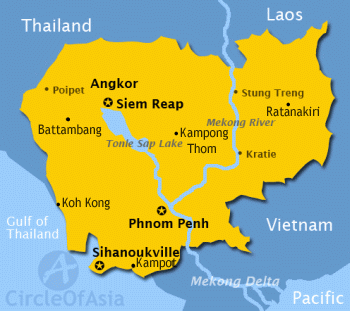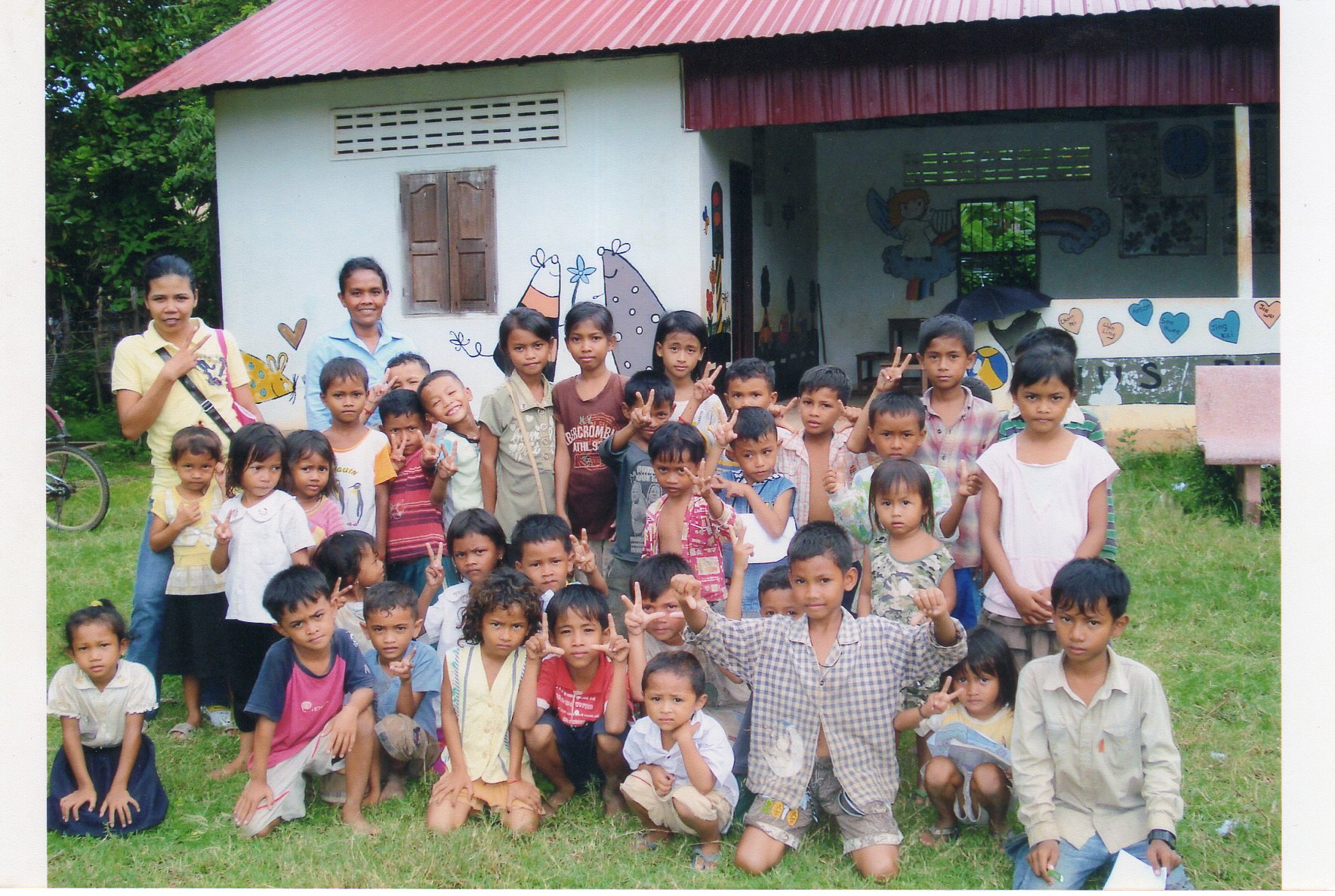The Story of Luckyman and the Helper Students for the Poor Children of Cambodia
The Lord says, "I will rescue those who love me.
I will protect those who trust in my name." Psalm 91:14
John Wentz and Nancy Plaxico spoke at Trinity UMC in January, 2011 about their experiences meeting Luckyman and the children in Cambodia. Excerpts of those talks are included here, detailing Cambodia's devastating history and Luckyman's journey through it.
The Country of Cambodia
(Nancy) Cambodia is bordered by Vietnam, Laos and Thailand.

The last 50 years in Cambodia have been very difficult. During the Vietnam War, the Ho Chi Min Trail ran along the border between Cambodia and Vietnam. That area was heavily bombed during the war. In 1975 the Khmer Rouge took over in Cambodia. This fanatical regime led by Pol Pot turned on their own country. About two million Cambodians lost their lives during the three years that the Khmer Rouge were in power. That’s out of a country of 12 million people.
The horrendous Khmer Rouge were overthrown in 1979, but things were still very difficult. In the 1980s and 90s, civil war continued to break out. It was just in the last 10 to 15 years that Cambodia started to stabilize and get on it’s feet. It is still one of the poorest countries.
One of the drivers for new growth in Cambodia has been tourism. Most of the tourists go to see Angor Wat, which is a huge complex of temples built a thousand years ago. It is one of the top wonders of the world. Angor Wat is located just outside of the town of Siem Reip. That’s where our story unfolds.
Luckyman Escapes From the Genocide
(John) As Nancy mentioned, Cambodia has had a bit of a rough past, especially during the more recent genocide. The story I’m going to tell you is how God has taken that tragedy, taken a Cambodian orphan from that tragedy, and brought him into partnership with Trinity United Methodist Church in order to help orphans and poor children in Cambodia.
There are many threads in this story. We’re going to show how God has woven them together to build this tapestry that brings children out of poverty and brings them into a relationship with Jesus Christ.
I’m going to start back in 1975, when the Khmer Rouge overthrew the Cambodian government. The southern part of Cambodia, that borders the ocean, had a governor. The governor’s son was Samuth Nouen. When Pol Pot overthrew the government, the governor was executed, along with the rest of Samuth’s family.
Samuth, a fifteen year old boy, fled into the jungle with many other Cambodians. They joined a group of about 33 others and headed for the Thai border, in order to escape the genocide. Along the way they had to pass through fields that had been mined by the Khmer Rouge. In the final mine field on the Thai border, thirty of the 33 refugees did not make it. Samuth, the fifteen year old boy, was one of only three who made it across that last minefield.
Once he reached Thailand, there were no refugee camps. Thailand didn’t want to have refugee camps. They didn’t know what to do with these people coming across their border, so they put them in prison. Samuth was put into prison. There he met the prison cook, who led Samuth to the Lord. He gave him a Bible and taught him about Christianity and what it meant to be a Christian. So Samuth became a Christian there, in a Thai prison.
When Samuth was released, he decided that he would not go to America or Europe, as many of the other Cambodian refugees were doing. Instead, he wanted to help Cambodia. He wanted to go back to Cambodia and help out as much as he could. He felt this was his call from God.
He began to learn a trade in Thailand, becoming a dentist. For thirteen years, he lived and worked in those refugee camps along the Thai border, working as a dentist.
In 1993, he was able to get back into Cambodia.
Samuth asked himself, "What is the best way I can help?"
Because of the genocide, there was a whole generation
that had lost its moral compass - its moral code. The people
had lost their ethics. The value of human life was no longer
there. So he was looking for a way to bring back what they
had lost, along with God.
In 1998 there was a third revolution in Cambodia. Samuth had to flee the country again. When he met the guards on the border of Thailand, he told them that this was the second time he had escaped death. They said, “We shouldn’t call you Samuth. We should call you Luckyman!”
.
God Connects Luckyman
and John Wentz
Now, I’m going to leave Luckyman in Thailand and talk about my own story, because it is woven in there as well.
In 1995, I was a fifteen year old boy. I was on a short term missions trip to Bolivia, in South America, with a teenage ministry. Before we left for Bolivia, we were challenged to pray, to ask God if we should be involved in missions.
So I earnestly prayed, “God, do you want me to be involved in missions.” I heard almost an audible voice saying, “Yes”. Then I asked, “Where do you want me to be involved?” and I heard, “Cambodia.” This was the clearest message from God that I have ever received.
When I returned from the mission trip, I started to learn about Cambodia. At that time I knew nothing about the country, except that it was in Asia. I searched the internet for information, found pictures of Cambodia children, and I would pray for them. I asked God, “What can I do?”
In 2001, my father connected me with the United Methodist Church in Cambodia. The Church Supervisor there invited me to come over and spend three weeks doing what I could to help out with the United Methodist Church. So I did that.
In the middle of that time, I took a break to see the temples at Angor Wat. This is the big tourist draw. I wandered around the temples, enjoying the sites. Then I was approached by a man who asked where I was from. When I told him that I’m from the United States, he became very excited. He was able to speak English.
He introduced himself as Luckyman. Then he began to tell me that he has a Christian school in nearby Siem Riep. He had brought some of his students in to Angor Wat, looking to meet somebody and tell them about the school.
So we talk a little bit, and I told them what I was doing there with the church. He became very excited when he found out that I’m a Christian. Because then he told me that he had been praying, and God told him that he was supposed to come to the temples to meet a Westerner who would help him. So that morning, he and five students on three bicycles rode ten kilometers from Siem Riep to the temples because God told him he was supposed to meet someone there. He didn’t know who that was. Then he met me.
I talked with him some. I gave him a small sum of money. I took a picture with him and the students. Then I went back to the United States, not really thinking much about it. I figured, you never know about people like this, or what’s going on in that situation.
Back in the States, I received a letter from Luckyman with receipts for all the things he bought with the money I had given him. He included pictures of his school. We began a correspondence which lasted for the next five years. My wife, Suzanne and I supported him when we could.
Then, in 2005 we decided to go to Cambodia and visit the orphanages and schools, and see how its going. We went over, met up with Luckyman, and found out more about his work.
We looked at the facilities, we taught at some of the schools, and we met with the children – wonderful children. We saw first hand the work being done.
Luckyman's Vision for the Schools and Orphanage and Their Current Need
Luckyman told me how, when he got back into Cambodia in 1998, he wanted to find a way to lift these children out of poverty and teach them about Jesus. He really felt God calling him to create these schools.
He began creating schools, with volunteer teachers coming to teach about Christianity. They gave them some rudimenterary agriculture skills, some selling skills, lessons on human rights, and Englilsh. If you can speak English in Cambodia, you can get a job that pays about $100 a month, and that’s a living wage. Being able to speak English really lifts people out of poverty.
Luckyman said his organization is called The Helper Sutdents for the Poor Children of Cambodia. He began it in the year 2000. He met me less than a year after that. It became an official non profit organization in 2005. They currently have five schools throughout the Siem Reap region, an agricultural area near Angkor Wat. They had run up to 9 schools, but they were reduced due to budgetary restraints.

372 students currently attend both primary and secondary schools. There is also an orphanage within Siem Reap. It currently has 12 children. The annual budget – the total budget for this orphanage and five schools – is $12,000.
Money goes a long way in Cambodia. But Luckyman also has a shoestring budget. This is how Trinity has been helping out. Three years ago, Trinity started donating $2000 a year. That, in addition to personal donations, has helped to keep the orphanage and schools going. I want to thank you for that.
So that’s the story. One of the keys that I want to leave with you in this story, is Luckyman, himself.
Our key verse for today talks about finding a refuge in the Lord when you trust in Him.Luckyman trusted in God, and he was protected in those mine fields. He is trusting in Him now, because it’s even worse. He has almost 400 people that are dependent on him, so he’s trusting for providence as well. The trust he has in the Lord is what carries him through.